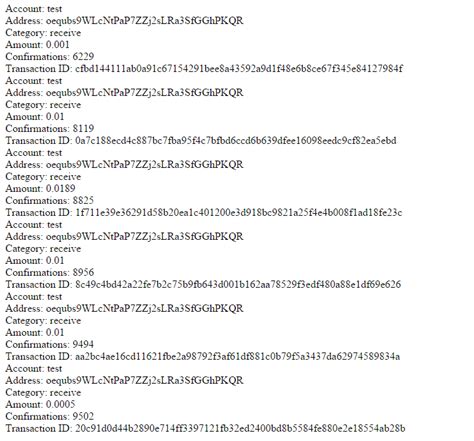Logging Incoming Transactions with Bitcoin-Node
When running multiple Bitcoin nodes, it is essential to track incoming transactions to ensure the integrity and security of the network. In this article, we will show you how to enable logging of incoming transactions on both Bitcoin nodes.
Why logging is important
Logging incoming transactions helps in several ways:
- Troubleshooting: If a node is experiencing a problem or is having trouble validating a transaction, logging can provide valuable insight into the problem.
- Network Monitoring: Log files help identify potential vulnerabilities and errors that could impact the overall health of the network.
- Regulatory Compliance: In some cases, regulatory bodies require logging to track cryptocurrency transactions.
Enable logging on Bitcoind nodes

To enable logging of incoming transactions on both Bitcoind nodes:
Step 1: Configure the node
- Log in to each node with the default username and password (usually “root”).
- Locate the “bitcointools.conf” or similar configuration files:
- On Ubuntu/Debian based systems, edit the
/etc/bitcoin/bitcoind.conffile.
- On Red Hat/Fedora based systems, edit the
/etc/bitcoin/bitcoind.conffile.
Logging configuration
The logging configuration is defined in the log section of the file. Add the following lines to enable logging of incoming transactions:
[logging]
level = debug
format = %datetime% %logger% - %levelname% - %message%
[loggers]
keys=root, bitcoin
[handlers]
keys=console,syslog
class=FileManager
filename=bitcoin.log
level=DEBUG
[formatters]
keys=verbose_format
Step 2: Apply the configuration changes
Apply the changes to both nodes. Make sure that each node is running the latest version of Bitcoin-Node.
Enable logging on multiple nodes
If you have multiple Bitcoind nodes running at the same time, make sure that all nodes can write to the same log file without overwriting each other’s logs. To achieve this:
- Set logging with
--loglevel=debugfor each node.
- Use a filesystem permission setting such as
chown bitcoin:bitcoin' orchmod 777 /path/log/file’ to allow write access.
Example use case
Assuming you have two Bitcoind nodes, node1 and node2, with a log file /var/log/bitcoin.log. To enable logging of incoming transactions on both nodes, add the following lines to the “bitcoind.conf” file:
[logging]
level = debug
[loggers]
keys=bitcoin,bitcoin-node
[handlers]
keys=console,syslog
[formatters]
keys=verbose_format
[node1]
level = debug
format = %datetime% %logger% - %levelname% - %message%
[node2]
level = debug
format = %datetime% %logger% - %levelname% - %message%
Conclusion
By following these steps, you can enable logging of incoming transactions on both Bitcoin nodes. This provides valuable insight into network activity and helps you troubleshoot any issues that may arise.
Remember to always follow best practices for secure file system access and permission settings when configuring logging for cryptocurrency applications.
